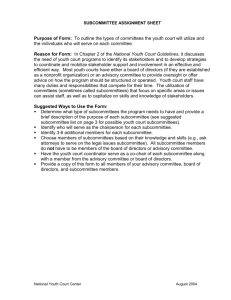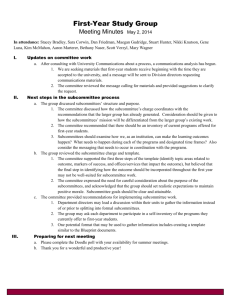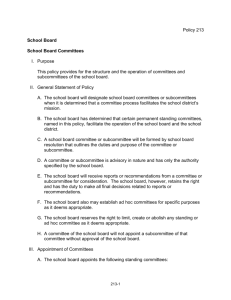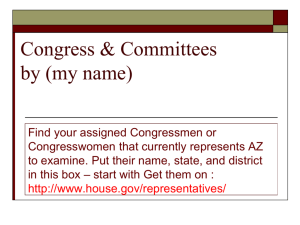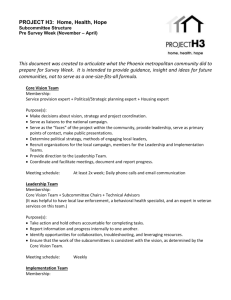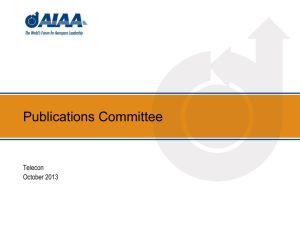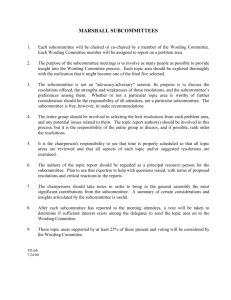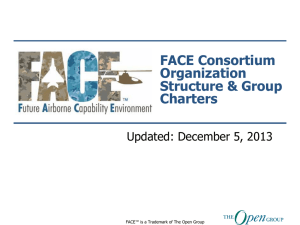stakeholders_and_subcommittees
advertisement
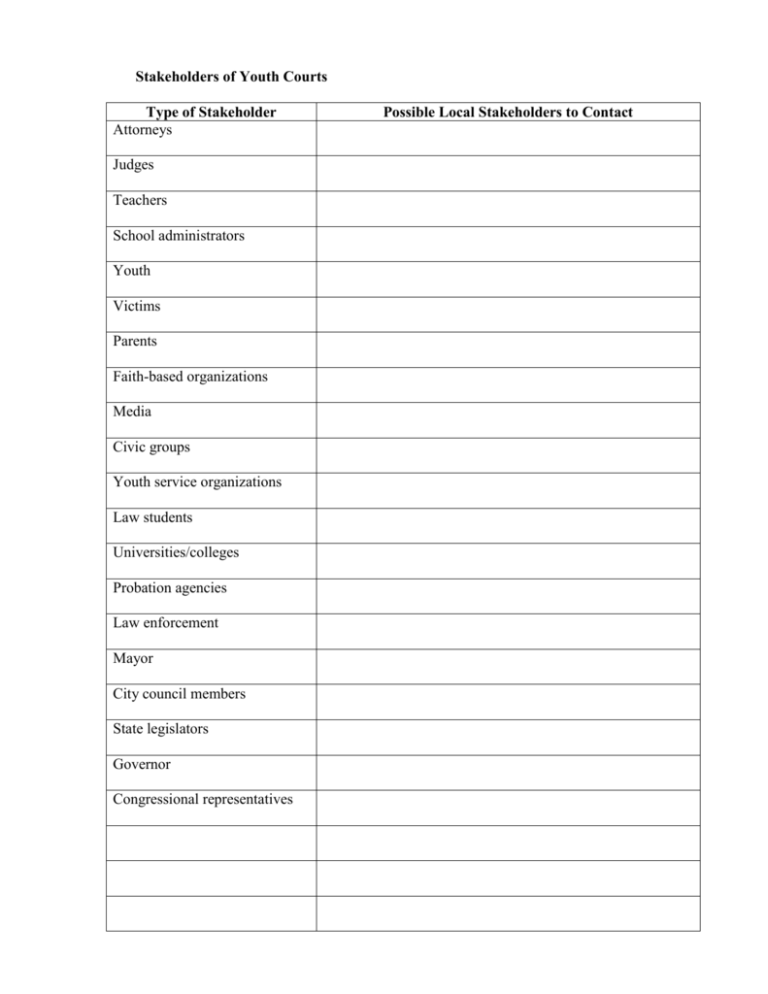
Stakeholders of Youth Courts Type of Stakeholder Attorneys Judges Teachers School administrators Youth Victims Parents Faith-based organizations Media Civic groups Youth service organizations Law students Universities/colleges Probation agencies Law enforcement Mayor City council members State legislators Governor Congressional representatives Possible Local Stakeholders to Contact SUBCOMMITTEE ASSIGNMENT SHEET Purpose of Form: To outline the types of committees the youth court will utilize and the individuals who will serve on each committee. Reason for Form: In Chapter 2 of the National Youth Court Guidelines, it discusses the need of youth court programs to identify its stakeholders and to develop strategies to coordinate and mobilize stakeholder support and involvement in an effective and efficient way. Most youth courts have either a board of directors (if they are established as a nonprofit organization) or an advisory committee to provide oversight or offer advice on how the program should be structured or operated. Youth court staff have many duties and responsibilities that compete for their time. The utilization of committees (sometimes called subcommittees) that focus on specific areas or issues can assist staff, as well as to capitalize on skills and knowledge of stakeholders. Suggested Ways to Use the Form: Determine what type of subcommittees the program needs to have and provide a brief description of the purpose of each subcommittee (see suggested subcommittee list on page 3 for possible youth court subcommittees). Identify who will serve as the chairperson for each subcommittee. Identify 3-6 additional members for each subcommittee. Choose members of subcommittees based on their knowledge and skills (e.g., ask attorneys to serve on the legal issues subcommittee). All subcommittee members do not have to be members of the board of directors or advisory committee. Have the youth court coordinator serve as a co-chair of each subcommittee along with a member from the advisory committee or board of directors. Provide a copy of this form to all members of your advisory committee, board of directors, and subcommittee members. [INSERT YOUTH COURT PROGRAM NAME AND CONTACT INFORMATION] Subcommittee Assignment Sheet Name of Committee: Purpose of Committee: Chairperson: Committee Members: Name of Committee: Purpose of Committee: Chairperson: Committee Members: Name of Committee: Purpose of Committee: Chairperson: Committee Members: SAMPLE SUBCOMMITTEES The following are some sample subcommittees a youth court may want to form. Some of these committees may only be needed during the development stage. Others may be ongoing committees, however, after the program is developed their focus may change. Each youth court will need to modify the type and description of the subcommittee duties to fit their program’s needs. Finance/Fundraising Committee Identify grants and fundraising opportunities. Research and seek out available community corporate funding and donations. Works with the director in writing all grants and submitting to appropriate agencies in a timely fashion. Personnel Committee Develop job descriptions for all volunteer and paid staff persons. Recruit and hire staff. Develop personnel policies and procedures. Volunteer Training Responsible for assisting staff in developing the initial and ongoing training programs for youth volunteers. Helps staff secure classroom space and supplies for training (manuals, copies, pencils, video equipment, etc.), arranges for speakers, designs pre-tests and post-tests, and provides general supervision during training. Constitution and By-Laws To draft the by-laws and constitution of youth court programs which are established as a nonprofit organization. Marketing and Community Relations Responsible to keep youth court visible within the community, primarily deals with the media and press. Volunteer Recruitment Identify strategies for recruiting youth and adult volunteers. Coordinate with marketing and community relations committee in preparing brochures, posters and presentations for the purpose of recruitment. Create volunteer applications and volunteer job descriptions. Ceremonies and Special Events Responsible for planning and organizing graduation and special recognition ceremonies. Referral Committee Establish respondents’ eligibility requirements and referral procedures. Work with staff to develop referral forms and communicate with referral agencies. Legal Issues Examines legal issues youth courts confront during the developmental and operational stages. Provides advice about and assistance in creating legal forms (e.g., Release of Information, Consent to Participate, Liability Waivers). Policy and Procedure Network with other subcommittees and assist staff in outlining the policies and procedures for the youth court and preparing a policy and procedure manual. Program Evaluation Assist staff in determining the types of process and outcome measures the program will assess each year. Assists staff in determining types of data needed and possible methods of collecting data. Helps staff analyze information and prepare annual report.
